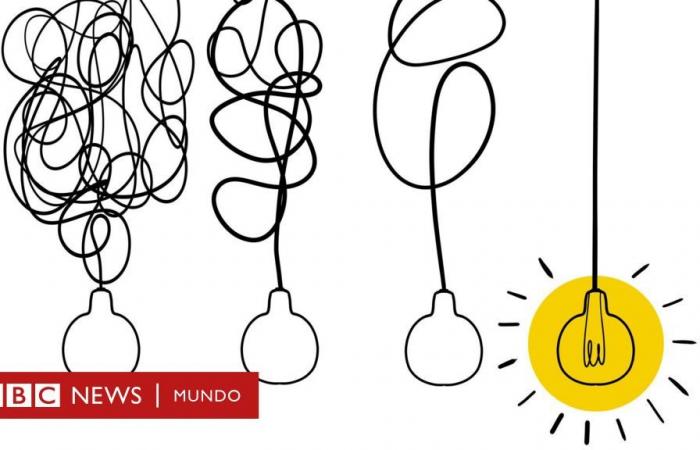
Image source, Getty Images
- Author, Drafting
- Role, BBC News World
-
56 minutes
We all, at some point or more, face problems.
And we tend to find some way to solve them, even if it’s not the best or the most creative.
But there is a method for solving complex problems that is recommended by a long list of great thinkers.
It is known as “first principle thinking” and promises to generate original solutions, unleashing our creativity.
The strategy is to identify the heart of the matter: the first principle, what the philosopher Aristotle described as “the first basis from which a thing is known.”
In other words, it consists of stripping the matter of conventions and prejudices, until we are left with what is essential.
In the process, you leave aside everything that is unnecessary and distracting, from “that’s how it’s always been done” to “it can’t be done” and “it’s never been done that way”, and you open the way to innovation.
Once the problem is deconstructed, and what matters is identified, is rebuilt on that solid foundation.
As visionary entrepreneur Elon Musk, perhaps the greatest proponent of first-principle thinking in our time, advises:
“It’s important to view knowledge as a kind of semantic tree; make sure you understand the fundamental principles, i.e. the trunk and the large branches, before you worry about the leaves (the details), or you’ll have nowhere to put them.”
Musk has talked about that approach on several occasions.
“I tend to approach things from a physical framework,” Musk told Wired magazine’s Chris Anderson.
“Physics teaches you to reason from the first principle and not by analogy.“.
Image source, Getty Images
In an interview with Kevin Rose, he explained that reasoning by analogy is “doing things because they resemble something that’s been done, or it’s like what other people are doing… with slight iterations on a theme.”
He added that although first-principle thinking “requires a lot more mental energy” it is essential to innovate.
Tim Urban, co-founder of the popular blog Wait But Why, explained the distinction between reasoning by first principle and by analogy as the difference between a pioneer chef and a cook.
The chef who creates from ingredients, instinct, experience, knowledge and senses reasons from first principles.
The cook who follows a recipe, even if he is one of those who capture the essence and interpret it, reasons by analogy.
Both can prepare delicious dishes, and even chefs follow recipes.
The point is that when you face a major challenge, and the choice is to create or copy, it is best to put on not only the apron but also the white hat.
A car and a rocket
Like many others before, that model has allowed Musk to do things that have never been done before, time and time again..
When it entered the electric vehicle industry, for example, Tesla’s mission was to accelerate the global transition to sustainable energy.
One of the key challenges he identified was cost reduction to produce cars at an affordable price for the mass market.
Although the incentive was not the same, the challenge echoed that faced by Henry Ford in the early 20th century.
Neither of them invented cars or the assembly line.
Ford’s genius was to adapt the moving assembly line process, allowing it to manufacture, market and sell the Model T at a price significantly lower than its competition, leading to the creation of a new and rapidly developing market. growth.
Musk’s genius was realizing that “the real problem, the real difficulty and where the greatest potential lies is build the machine that builds the machine. In other words, it is building the factory,” he highlighted.
By conceiving “the factory as a product,” the “gigafactory” was born, a facility that was hailed as a game-changer in the automotive and energy industries.
Image source, Getty Images
Famously, he used the first principle strategy again when he began exploring the idea of sending the first rocket to Mars, and ran into astronomical prices.
“So I said, ‘Okay, let’s look at first principles. What is a rocket made of? Aerospace-grade aluminum alloys, plus some titanium, copper and carbon fiber.’
“I asked, ‘What’s the value of those materials on the commodity market?’ It turned out that the cost of materials for a rocket was about 2% of the typical price.”
He decided to build his own spacecraft, and within a few years, his company SpaceX had reduced the launch price of a rocket by almost 10 times while still making a profit.
What if you’re not a Musk?
Musk’s experiences are widely cited not only for being illustrative but because he has been interested in spreading the concept of first-principle thinking.
But The examples of its application are innumerable and in all fields and times.…even on a more personal level.
Don’t you have a good memory because your head doesn’t fit so many things?
If you take the first principle approach, you question it and really ask yourself how much information we can physically store in our minds.
The average adult human brain can accumulate the equivalent of 2.5 million gigabytes of memory.
If you don’t want to forget, you can reframe the problem and look for the most optimal way to solve your memory problem.
Thus, the method calls us to think like scientists, based not on assumptions but on certainties.
The goal is to have the clarity you need when you’re doing something for the first time or dealing with something complex or trying to understand a situation you’re having trouble with.
As Nobel Prize-winning physicist Richard Feynman said: “The first principle is not to deceive yourself… and you are the easiest person to deceive”.
And remember that you can receive notifications in our app. Download the latest version and activate them.

